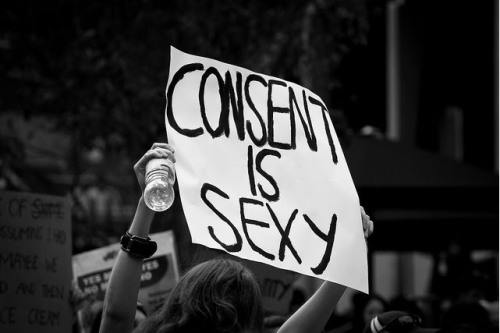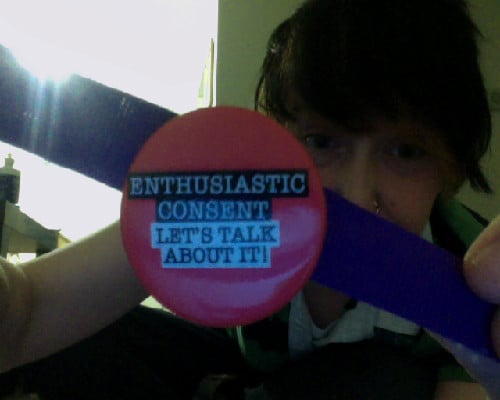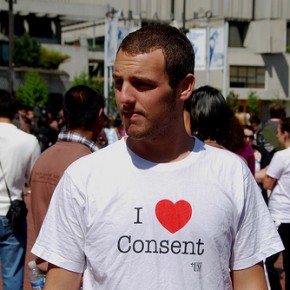Eaton of Growing up Goddy has written a much needed jeremiad against a poisonous strain in our rhetoric about sex and consent. From his essay:
In the world I was raised in, most junior high, high school, and perhaps even college students were unlikely to give explicit consent — even though they were willingly having sex. I don’t just mean girls, either — both men and women in that environment had the lessons of immorality, temptation, and so on drilled into them. Sex was treated as a dangerous thing that all people desired, but good people resisted. Falling into temptation was perhaps understandable, but planning for it or encouraging it? That was embracing sin and deliberately rebelling against God… A close friend of mine once explained without irony that using condoms was a more serious sin than unprotected premarital sex, because it implied premeditation.
…In that kind of environment, the idea of deliberately, actively, openly choosing sex — owning up to it and telling your partner that you’re ready — is practically unthinkable. Pushing boundaries, both your own and your partner’s, becomes the only way anyone gets laid, and over time it becomes normed. Protest, conflicted sex, and a veneer of regret functions as a sort of polite fiction, and many of the kids get what they want out of it. They have sex with their partner, and they don’t feel quite as much guilt because they can convince themselves that “It Just Happened.”
But inevitably, you get the dark side: some asshole learns “that’s how it works,” and date rapes a girl (or several) in his youth group, or goes on to college and does the same because — hey, that’s how it works! That kid assumes that a woman’s ambivalence — or even protest, depending on how deluded he is — is just part of the polite fiction “everyone” uses to avoid guilt and regret about their own sexual choices. In other cases, young women in the youth group culture are coerced into having sex, and understand that something terribly wrong has happened, but have no clear way of articulating how it’s different than what everyone else is doing. In some cases, they lack the language to explain how date rape is different from what they have voluntarily engaged in… The hardcore abstinence message of the conservative suburban youth groups I knew, and the poisonous atmosphere of normalized denial and rationalization, are basically training a generation of men and women who literally don’t understand what sexual consent looks like.
I blogged about this “sex as irresistible force” awfulness about a year or so ago, when I was creeped out by a Christian who would give his daughters an HPV shot but wouldn’t tell them what it vaccinated against. In his mind, compromising any reason to not have sex was unthinkable; his daughters needed every defense they could get. It’s fine to talk about when not to have sex, but, unless you’re the Shakers, you need to put at least as much effort, if not more, into explaining how to have appropriate sex.
Eaton (and Kevin Roose, back at “Call Him Voldemort!”) does a good job explaining how the extreme purity model of some Christians prevents reasonable discussions about consent. So, while I’m linking you to him, I thought it would be a good time to call out one similarly destructive secular and sex-positive model.
If you watch a romcom, read a novel with romance, or listen to people talk, it’s easy to think that the best proxy for intimacy is one partner’s capacity for intuition. We think that the measure of a partner is how well he or she anticipates our needs and desires, without having to ask. This doesn’t just apply in the bedroom; we have scorn for a partner who doesn’t know what to get as a birthday gift and has to ask. This is bizarre. If you’re screening partners for how good they are at modeling future behavior, date statisticians. If you’re looking for someone who cares more about serving you than about showing off their precision of their model of you, date someone who isn’t ashamed to ask about your preferences.
By promoting the spontaneous, intuitive model of sexual encounters, we’re not leaving room for frank discussions about consent and comfort. When one partner says “slow down” or “I don’t want to do that” or even “Can you try x?” we think that points to a communication problem. Why didn’t the other person know?
You’ll see this in movies or tv shows. When one character tries to move from kissing to something else, s/he almost never pauses to ask the partner if they’d like to turn things up a notch. And when one person in the scene rebuffs the new sex act, the couple almost never continue at the previous level of intensity, they sit up in their artfully draped sheets and try to figure out what went wrong.
This is a terrible norm. The default is to keep pushing someone until they say no. And it’s not always clear what counts as a clear no, since romances in popular culture tend to include a lot of girls that “need” someone to push them to loosen up and stalking that gets rewarded. I guess the only thing that’s totally clear is saying, “No!” and belting your partner across the face. (Oh wait). So we end up with another group of people who, in Eaton’s words ” literally don’t understand what sexual consent looks like.”
It shouldn’t be this hard to tell desired sex from undesired sex. We want a better diagnostic criteria for dividing real consent from coerced, impaired, or absent consent. That’s what enthusiastic consent (coined by Antioch) is meant to do. Instead of setting a high standard for what kind of no is a “real no,” people who practise enthusiastic consent assume the default is “No” unless they get an unambiguous and specific “Yes.”
A common objection to “enthusiastic consent” (which is sometimes glossed as “consent is the presence of a ‘yes’ not the absence of a ‘no’) is that having to talk about sex with prevent people from ever having sex. To which I say, tough beans. The intuitive model doesn’t mean that two partners are in sync, it just means it’s harder to notice when they’re going wrong. Besides, Dan Savage and the BDSM community have shown it’s possible to have community norms of talking to your partner and then having sex. And if you think it’s worse to have an awkward conversation than possibly coercing your partner, then no one should have sex with you anyway.
Bonus: Cliff from the Pervocracy has another excellent essay about how we use jokes and cliches to blur our norms about consent and respect in a way that makes it harder to know how to treat other people well.



















